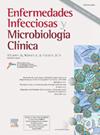Análisis comparativo de las infecciones respiratorias agudas de etiología viral en menores de 6 meses con y sin nirsevimab en Baleares (2022-2023 y 2023-2024)
IF 2.5
4区 医学
Q3 INFECTIOUS DISEASES
Enfermedades infecciosas y microbiologia clinica
Pub Date : 2025-04-01
DOI:10.1016/j.eimc.2024.07.007
引用次数: 0
Abstract
Introduction
Since 2023, a monoclonal antibody (nirsevimab) specifically directed against the preF form of RSV has been marketed in Spain. The impact of late immunization in the population < 6 months as a cause of other respiratory infections requiring a hospital visit has been analyzed.
Material and methods
The viral etiology of acute respiratory infections (ARIs) diagnosed in the 2022-2023 and 2023-2024 seasons has been prospectively compared, and in this last season between recipients and non-recipients of nirsevimab. Global provisional coverage was 77% of the population.
Results
In the 2022-2023 season, 303 < 6 months with an ARI were detected, while in the 2023-2024 season there were 278 minors (19% less). The positivity in the first season was 79.9% compared to 70.5% in the current season. A significant difference has been observed in the detection of RSV between both groups and a decrease of 82.9% of cases in the current season. Of the 278 cases < 6 months detected in the 2023-2024 season, 192 (69.1%) received immunization with nirsevimab and 86 (30.9%) did not receive it. The percentage of positivity in those immunized was 69.3%, compared to 73.3% in those not immunized. Significant differences have been observed in the detections of RSV and influenza between both groups.
Conclusions
Immunization at < 6 months with nirsevimab has shown a significant reduction in RSV infections compared to the previous season. It does not seem, however, that it can reduce infections by other respiratory viruses.
巴利阿里群岛(2022-2023年和2023-2024年)6个月以下儿童中使用和不使用nirsevimab的病毒性急性呼吸道感染的比较分析
自2023年以来,一种专门针对RSV preF型的单克隆抗体(nirsevimab)已在西班牙上市。晚免疫对人群的影响<;6个月作为其他呼吸道感染的原因,需要去医院就诊。材料和方法前瞻性比较了2022-2023年和2023-2024年两季诊断的急性呼吸道感染(ARIs)的病毒病因学,并在最后一季比较了接受nirsevimab治疗和未接受nirsevimab治疗的患者。全球临时覆盖率为77%的人口。结果在2022-2023赛季,303 <;在2023-2024赛季,有278名未成年人被检测出患有急性呼吸道感染(ARI),减少了19%。第一季的积极度为79.9%,而本季为70.5%。两组间RSV检出率有显著差异,本季节病例数下降82.9%。在278个案例中在2023-2024季节检测的6个月内,192例(69.1%)接种了nirsevimab, 86例(30.9%)未接种。免疫组阳性率为69.3%,未免疫组阳性率为73.3%。两组之间在RSV和流感的检测中观察到显著差异。结论<;与前一个季节相比,使用尼塞维单抗6个月后,呼吸道合胞病毒感染显著减少。然而,它似乎不能减少其他呼吸道病毒的感染。
本文章由计算机程序翻译,如有差异,请以英文原文为准。
求助全文
约1分钟内获得全文
求助全文
来源期刊
CiteScore
2.10
自引率
8.00%
发文量
194
审稿时长
29 days
期刊介绍:
Hoy está universalmente reconocida la renovada y creciente importancia de la patología infecciosa: aparición de nuevos agentes patógenos, de cepas resistentes, de procesos con expresión clínica hasta ahora desconocida, de cuadros de una gran complejidad. Paralelamente, la Microbiología y la Infectología Clínicas han experimentado un gran desarrollo como respuesta al reto planteado por la actual patología infecciosa. Enfermedades Infecciosas y Microbiología Clínica es la Publicación Oficial de la Sociedad Española SEIMC. Cumple con la garantía científica de esta Sociedad, la doble función de difundir trabajos de investigación, tanto clínicos como microbiológicos, referidos a la patología infecciosa, y contribuye a la formación continuada de los interesados en aquella patología mediante artículos orientados a ese fin y elaborados por autores de la mayor calificación invitados por la revista.

 求助内容:
求助内容: 应助结果提醒方式:
应助结果提醒方式:


